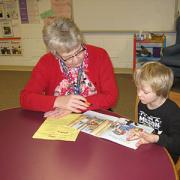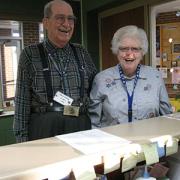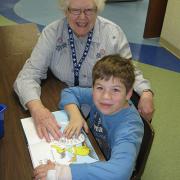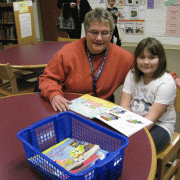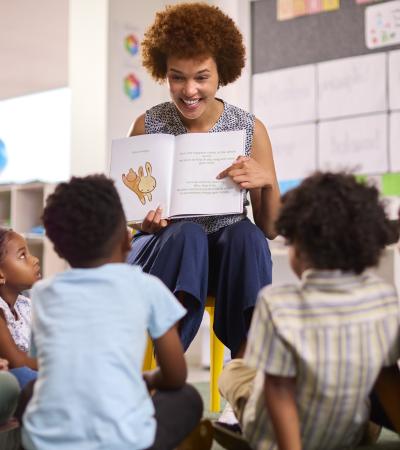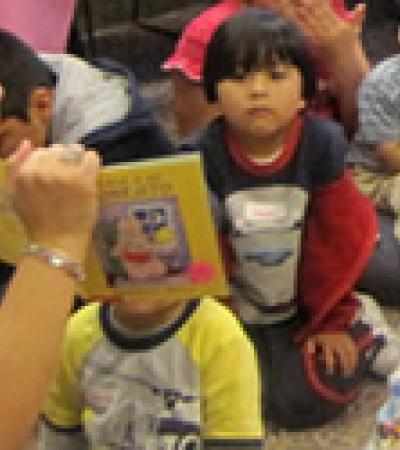Reading Friends pairs student volunteers and retirees with young students to help them learn, and love, to read. Young and older readers meet weekly to enjoy books together. The work continues in the summer as Northern Waters Learning, recruiting adult and junior/senior high students to read weekly with students who struggle with reading.
Advanced Planning
We have two goals for this program:
1) For students to learn to and love to read.
2) To close the gap between students who were behind their peers on standardized measures of reading achievement.
We take the first month of school to match tutor/tutee pairs and to work out a schedule. A similar process happens at the end of the year to prepare for summer tutoring.
The school librarian, the coordinator of Reading Friends, and the coordinator of Northern Waters Learning collaborate to plan, schedule and manage the program.
With the Common Core State Standards, Response to Intervention (RTI) in reading and math, and various other programs constraining the shape of our day, including the available time for Reading Friends, we have had trouble scheduling. As such, we have shortened the tutoring sessions and most occur first thing in the morning.
Marketing
We send home fliers to parents so they can sign up for the summer portion of the program. The school librarian also calls and speaks to each family to encourage attendance. This year, that equaled over 100 phone calls, but it was worth it!
Nothing is needed to promote the portion that happens during school hours, although we do inform parents.
Budgeting
This work can be done on a shoestring. We spent $75 dollars on used books, $30 on lanyards, and $100 on book bags (which, it turns out, we really didn't need).
Program Execution
More than 40 percent of our students at St. Croix Elementary receive free or reduced lunch. While they consistently do well on state tests overall, some students need an extra boost. During the school year, the Reading Friends help us meet these needs. Each pre-K through first-grade classroom has at least one dedicated volunteer who spends an hour or more weekly with a student. Volunteers read aloud to a student, or listen to the student read a short story, and teachers send students with an appropriate book for these activities.
In second through fourth grade, students are paired with a "friend" for 15- to 30-minute sessions weekly. Students are selected based on test scores and teacher input. They are often the children who need extra help but do not qualify for RTI services. Reading Friends prevents them from falling through the cracks.
Friends meet in the library or at tables in the hallway.
In the summer, the program is similar except pairs meet for an hour a week at the public library or at the school's Kid's Care, a childcare program in the school cafeteria.
When evaluating the Reading Friends initiative, we look at our assessment data disaggregated into groups: those who worked with Reading Friends and Northern Waters Learning tutors and those who did not. Last year, over 70 percent of students in the summer program actually grew on measures of standardized achievement. Not only did we halt summer slide, we turned it into summer acceleration.
Read a School Library Journal article about Reading Friends.
Advice
Here are some tips and hints for making a Reading Friends program work:
- First and most important, find a community member to be your partner. Having a community leader who can recruit, organize and cheerlead is essential.
- Similarly, a school liaison is needed — a library media specialist is ideal. Check with your district on the need for background checks. All of our Reading Friends were required to have commercial background checks.
- Conduct a simple training session for the volunteers where you share the goals of the program. Explain that their role is to listen to and help their young friends read.
- Work with teachers so they know how to gather appropriate books for their students and have them ready to go.
- We use canvas bags with the Reading Friends logo on them.
- Welcome and support your volunteers. We have lanyards with badges ready to give out to our "friends."
- Most teachers contact Reading Friends before their first classroom visit, and we always greet them with a friendly smile and a quick chat when they visit each week.
- Celebrate together! We have twice yearly gatherings where teachers and adult Reading Friends share a snack, talk, tell stories and laugh.
Supporting Materials
- Feedback (Coming Soon!)
- Programming Librarian Facebook Group

